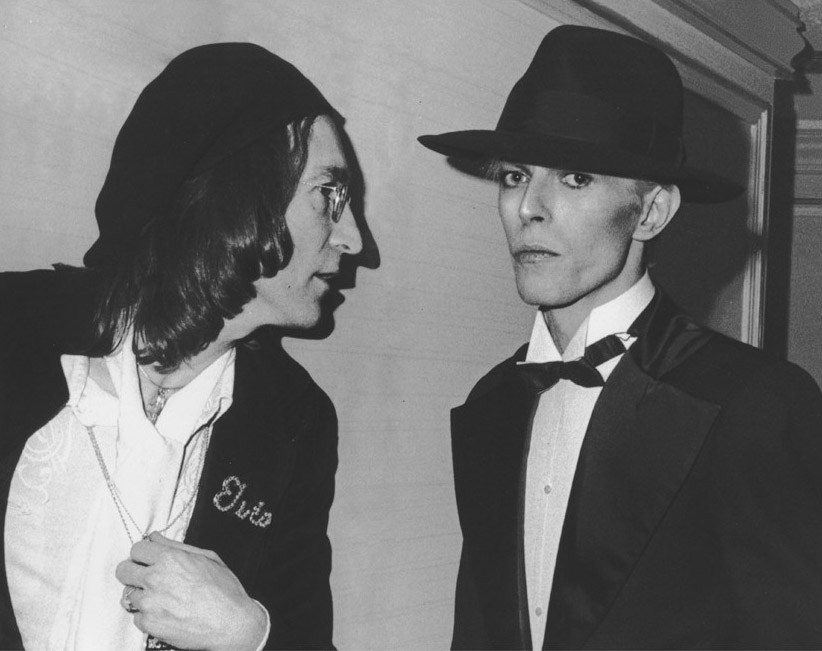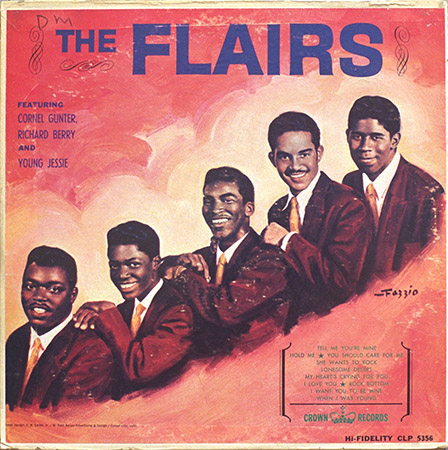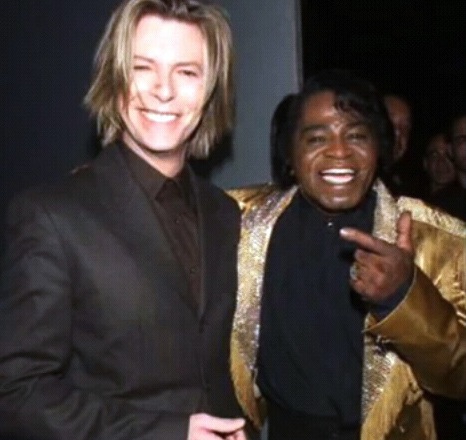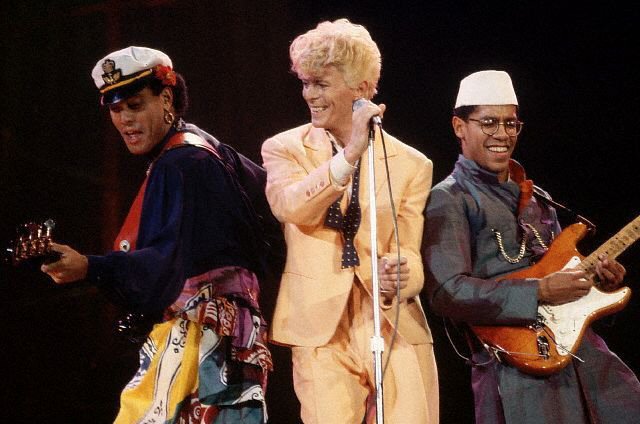![]()
(David Bowie and Carlos Alomar – superb photo by David Plastik of IconicPix)
For the past few weeks, I’ve been using this LOUIE blog as an excuse to explore some of the unlikely connections between David Bowie and LOUIE LOUIE.
With the passing of David Bowie, I certainly learned a lot more about this multi-faceted artist.
I didn’t realize that Bowie’s very first #1 single in the USA was his 1975 collaboration with John Lennon “Fame,” which I thought used a recycled James Brown riff.
As it turned out, there was much more to the origin of this song than I realized.

David Bowie discussed how this song created in a Washington Post article dated June 9, 2002:
“Carlos Alomar said, ‘Oh, I know that old thing [Footstompin’].’ And he said, ‘Listen, I’ve got this great riff that we could use for it.’ It was something that he’d written for James Brown, though Brown never used it…
[In 1975] Lennon said, ‘You know, let’s do something.’ I said, ‘Yeah, what can we do?’ And I said, ‘Carlos, that riff you’ve got!’
We used it for Fame but it came from our version of Footstompin’. Fame was built around a recycled riff.”
The CBC Music Rear-View Mirror website discussed the creation of this song, and the James Brown connection:
In the mid ’70s, James Brown found himself at a crossroads. Musical tastes were changing and he wanted to stay relevant. So he took some inspiration, and arguably a little more, from the hottest musician on Earth at the time: David Bowie.
In late 1974, David Bowie made an appearance on the extremely popular Dick Cavett Show. James Brown was watching and was struck by two things. First, he saw a familiar face, that of guitarist Carlos Alomar, who quit James Brown’s band five years before. Second, he heard an amazingly funky riff that Alomar was playing. “
Here’s the clip of David Bowie performing “Footstompin'” with guitarist Carlos Alomar on the David Cavett Show.
Here’s a performance “Fame,” with songwriting credits shared by David Bowie, John Lennon, and Carlos Alomar.
Around the same time that “Fame” was being assembled, James Brown was also in the studio, recording a song called “Hot (I Need To Be Loved),” which recycled Alomar’s riff, note for note, but with James Brown listed as the sole songwriter.
Here’s where it gets even more interesting…
The original version of “Footstomping” was a single by the Flares, which came out in 1961 on FELSTED label, number 8624.
As you can hear, it doesn’t have the catchy guitar riff.
As my friend David J. Coyle pointed out, the name of the Flares should be a familiar name to LOUIE enthusiasts.
I didn’t even think of connecting the Flares with the Flairs….

The Flairs was the musical group that provided Richard Berry (author of LOUIE LOUIE) with his first opportunity to be signed to a record label. Originally, the band was called the Debonairs, featuring some talented teenagers from Jefferson High School in Los Angeles. As the band developed, it eventually merged with some members of a band called the Flamingos (not to be confused to with a band of the same name from Chicago). In December 1952, the band recorded some audition tracks with a local record label/ record store known as Dolpin’s of Hollywood. As there didn’t seem to be much interest in the band, they chose to look for another record label.
The band found a receptive ear with Modern Records, a label run by the Bihari brothers that had already released some successful records by B.B. King, John Lee Hooker, Lighting Hopkins, and Big Joe Turner, to name a few few.
Marv Goldberg described how the band was renamed as the Flairs:
Modern decided that the Debonairs would come under the wing of Joe Bihari (the youngest of the brothers) and be placed on the (mostly Country & Western) Flair label. While the “Debonairs” wasn’t a bad name, Bihari suggested that they rename themselves the “Flairs.” The group thought it over and quickly realized that if they were named after the label, the Biharis would have a greater stake in pushing their records.
Within a few years after the band first recorded as the Flairs for the Flair label, Richard Berry left the band to form a brand new band known as Richard Berry & the Dreamers (which later evolved into the Blossoms – another interesting story). The Flairs continued with a variety of different personnel changes, changing record labels, and eventually evolving into a band known as the Flares with no members of the original band.
Despite rumors elsewhere on the interwebs, I have not found any evidence that Carlos Alomar was ever a member of the Flares, which actually split up in 1964. Carlos simply covered this Flares song when he was part of the Bowie band, and added a little extra pizazz to the mix…
During an eight-month period in 1968–69, Carlos Alomar toured with James Brown’s live band, eventually quitting after being docked wages for missing a musical cue.
Approximately five years later, Carlos Alomar joined David Bowie’s band during second portion of the Diamond Dogs tour in September–December 1974, and he came up with this particular riff for a performance of “Footstomping” during the tour. Bowie thought was “a waste” to only use this riff for a cover song, and thought it would be best to come up with a brand new song… which became “Fame.”
The Plain or Pan website shared some additional information and insight on the two songs inspired by the Carlos Alomar guitar riff:
Both tracks, it turns out, were recorded sometime in 1975 at Electric Lady Studios in New York, Bowie’s in January and Brown’s later on in the year. Carlos Alomar, having played with many of the band still backing James Brown at this time was, by all accounts, absolutely livid by the steal. Bowie was a bit cooler, agreeing to sue if the track became a hit, which it never did. It’s interesting to note that in the fully comprehensive booklet that accompanies the James Brown Star Time Box set, where recording personnel are meticulously listed, under Hot (I Need To Be Loved, Loved, Loved) it just says ‘backing by unknown personnel’, which, for me, is just about as good an admittance you’ll get that James Brown took the original Bowie track, dubbed out his voice and sang his own melody across the top. Just my theory, at any rate.

The bottom line: Carlos Alomar created some great music with David Bowie, John Lennon and James Brown – three brilliant musicians that will never be forgotten!
… and using the “Five Degrees of LOUIE LOUIE Principle,” we’ve got yet another connection that somehow ties David Bowie to the LOUIE LOUIE universe!

Reference Links
RIP: David Bowie (aka Davie Jones) + LOUIE LOUIE part 1 – LOUIE of the Week
David Bowie + LOUIE LOUIE part 2 / Les Dantz – LOUIE of Week
Wikipedia on Fame (David Bowie song)
CBC Music Rear-View Mirror: The Song That Both David Bowie And James Brown Stole
Death of David Bowie: his friendship with John Lennon recalled
Marv Goldberg’s R&B Notepad – The Flairs
Modern Records Story By David Edwards and Mike Callahan